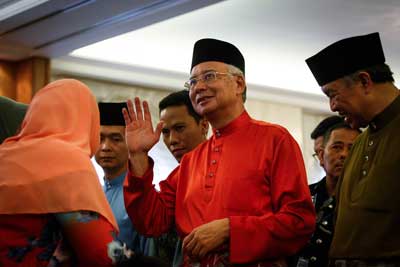Investigative reporting on alleged mismanagement of a Malaysian state investment fund has triggered a backlash against muckraking media. On Friday, the Home Ministry ordered the suspension of two local news publications, The Edge Weekly and The Edge Financial Daily, for three months on the grounds that their reporting on the fund, known as 1Malaysia Development Berhad (1MDB), had prejudiced public order, security, and national interests, according to news reports. The suspension came into effect today.
The Edge chief executive, Ho Kay Tat, told reporters that he would challenge the legality of the ban and that in the meantime his media group would continue to publish online. “This is nothing more than a move to shut us down in order to shut us up,” Ho was quoted saying by The Associated Press. The Immigration Department imposed a travel ban against Ho and two opposition politicians last week, without specifying a reason, according to Suaram, a local human rights group.
The Edge is only the latest news outlet to be harassed. On July 20, the government’s media regulator, the Malaysian Communications and Multimedia Commission, blocked access to the Sarawak Report news website, which has likewise reported extensively on the 1MDB allegations, including accusations that Prime Minister Najib Razak received money from the fund. Home Minister Seri Ahmad Zahid Mamidi was quoted in news reports on Friday saying that the website’s editor and founder, Clare Rewcastle Brown, a British national, could be extradited from London to Kuala Lumpur on charges that her reporting had violated Malaysia’s sovereignty.
In a July 20 report, Sarawak Report claimed that “teams of stalkers” have followed Brown near her home and her London office and while she was driving, and took pictures of her in a public park. The report said London police are investigating the matter and placed a protection detail on the case. The whistleblower site was inaccessible globally for a period on Sunday morning in an apparent hacking attempt, according to news reports citing Brown. It was not immediately clear who was behind the apparent cyber-attack.
The Wall Street Journal–which reported on July 2, citing documents from a government investigation, that US$700 million of the 1MDB fund’s cash had ended up in Najib’s personal bank accounts–may be next in the legal firing line. Najib’s personal lawyers sent a letter to the newspaper on July 8 seeking clarification on whether its report and a follow-up op-ed implied that the premier had misappropriated funds. They have threatened to sue the newspaper and its publisher for defamation but not yet taken action, local reports said. The Journal‘s publisher, Dow Jones & Co., told the lawyers that its articles “speak for themselves” and stands by its reporting, according to a copy of Dow Jones’ response provided to CPJ.
Najib denies taking 1MDB funds for personal use, and has referred to the allegations as “political sabotage” aimed at toppling his elected government. In an early July Facebook post, Najib accused former Premier Mahathir Mohamad of being the source of the allegations and questioned the veracity of documents cited in news reports.
As threats mount against the media, journalists may find it increasingly difficult to report and publish on an issue of public concern. Earlier this year, Najib’s government cracked down hard on critical commentary about the criminal trial and conviction of political opposition leader Anwar Ibrahim on sodomy charges. Political cartoonist Zulkiflee Anwar Ulhaque, known as Zunar, now faces a possible 43 years in prison on multiple sedition charges for raising questions about judicial independence in a series of tweets about the trial.
His trial is scheduled to begin on September 9. More legal harassment aimed at silencing journalists who have dared to check Najib’s scandal-plagued administration is likely in the pipeline.
